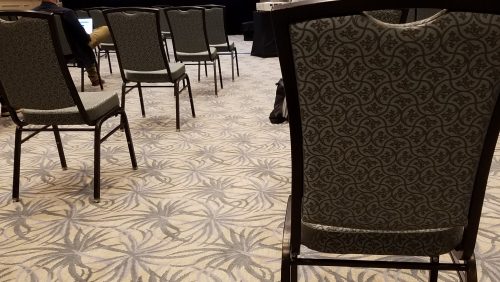Ah the joys and pains of a hybrid conference. Accentuating the positive, I got to hear a librarian live from Lesotho(!) describe digitization efforts for African materials. And in some rooms, every seat was an aisle seat.
I’ll focus my report on two programs:
“Looking for Trouble: Seeking out, Resolving, and Preventing E-resource Link Issues” A staff member culls actual search strategies from reference question tickets (e.g. LibAnswers), tries each chosen search in their discovery system, and then tests the first 40 results to see if the OpenURL links work optimally or not. Typically, about one of the 40 doesn’t work, so the librarian follows up. Using this method, they uncover and resolve problems before the patrons report them. For example, they realized that SAGE links had started going to the journal homepage instead of to the article. The speaker further reported on how they enhanced their system for reporting broken links as well as how they improved the form UX over time to encourage reports while discouraging false-positive reports. This talk included takeaways for libraries that wanted to adapt this approach.
“Centering Equity, Diversity, and Inclusion in Collections Assessment” Not the same program that Morgan reported upon, but it sounds similar. The VIVA consortium revised a longstanding evaluation rubric to incorporate how well existing products measured up in terms of EDI, OA, and accessibility. These factors were included alongside existing factors like usability and how well the content matched curriculum. In the end, these factors didn’t help distinguish the products from each other. They revised the rubric to eliminate factors where every product scored the same. They acknowledged that the EDI part of the rubric might reward performative behaviors (like having an EDI statement on a website) but actual action is harder to prove. One non-performative exception is a lived name policy for authors. Since it takes significant time to populate the rubric for any given resource, they suggested only using it for viable cancellation candidates. They don’t have any experience with adding products recently, so they haven’t considered how it would apply to potential purchases. They also didn’t discuss how to choose when these values conflict with each other (e.g. what if full accessibility requires the deep financial resources that only a non-OA publisher can afford to deploy?).
I’ll leave you with this view from my hotel room.
On the first evening, I spotted two separate professional photo shoots on the top of this parking deck. What’s the appeal of this location? I took a walk over there myself another evening (forgot my phone, alas), and decided that there are certainly better skyline overlooks in the city, although perhaps admission to these other sites would cost more than just paying to park your car.

3 Comments on ‘Carol at Charleston 2021’
The question you pose of what happens when OA publishers can’t afford to provide full accessibility is an interesting conundrum. Upholding standards and holding others to them is difficult when the playing field is uneven. Thanks for sharing your thoughts.
Glad to know you investigated the parking deck photo shoot. 🙂
Thanks for bringing back useful info for us from the Charleston Conference!